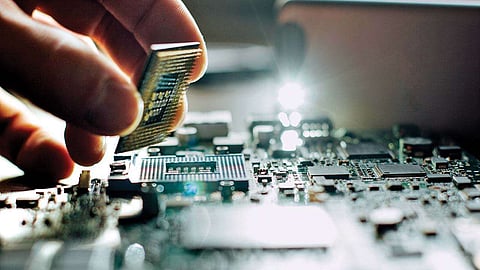Union Government Releases First Instalment For Centre Of Excellence For Electronics Products At Noida
Lucknow, January 6 (TNA) In a big boost to advanced technological support for small and medium scale enterprises, startups and high-end manufacturing units of electronics sector, establishment of Centre of Excellence (CoE) under U.P. Electronics Manufacturing policy in Noida has been put on fast-track.
In a significant development, Ministry of Electronics & Information Technology (MeitY), Government of India has released first instalment of Rs 659.66 Lakhs for the lithium-ion cell based centre of excellence project.
Additional Chief Secretary, IT & Electronics department, Alok Kumar informed that the State government had already consented to contribute its share of Rs 219.90 Lakhs to initiate the first phase of activity of the CoE.
To be implemented by Centre for Development of Advanced Computing (C-DAC), Noida in collaboration with Indian Cellular & Electronics Association (ICEA), the estimated cost of the CoE project is Rs 1675.89 Lakhs, of which Rs. 854.90 Lakhs will be MeitY’s contribution, while Uttar Pradesh government and Indian Cellular & Electronics Association (ICEA) will contribute Rs 284.99 Lakhs and Rs 536 Lakhs respectively.
Kumar informed that project implementation period had been fixed at 36 months from December 30, 2020, and therefore, the Centre of Excellence is well on course to be completed by last week of December 2023.
Referring to the objectives of CoE, Additional Chief Secretary said that the Centre of Excellence was aimed at design and development of products related to power bank industry, mobile handset accessories and electronics applications.
It will also provide standardization and testing support for in-country and global needs. Lithium-ion battery is a rechargeable battery that uses lithium ions as the primary component of its electrolyte.
The Centre of Excellence will be developed on self-sustainable business model with industry outreach for transfer of technology and product testing support. Infrastructure for testing and other requirements with a fully functional testing lab to be utilized by Bureau of Indian Standards (BIS) will be developed at the centre.
The CoE will be equipped with fully functional tool room and component library. Once established, five products, i.e. chargers, power banks and wireless power banks, LED and speakers based on lithium-ion cells will be developed and tested during the first year.
It is planned to develop four products during the second year, including battery monitoring system for electric vehicles, solar plants and solar system battery pack, whereas, GPS navigation system, UPS system and ticket vending machines are proposed to be developed during the third year.
It is noteworthy that apart from providing services to the electronics industry, CoE will also work for skill development in electronic system design and development.

